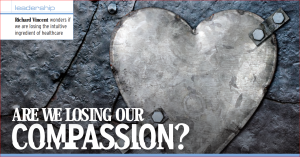When we reflect on the reasons to come alongside those who are hurting physically and serve them around the world, compassion must be the #1 reason. It was the foundation of the early church’s response to human suffering around them, even before medical care became more professional. The prophet Malachi exhorts God’s people to “do justice, love mercy and walk humbly before our God.” So are we in danger of losing our compassion?
This article in the Christian Medical Fellowship journal by Richard Vincent says there is good evidence that we are losing our compassion. Over 17,000 scholarly publications have appeared investigating the loss of compassion around the world. A 2014 report in the UK brought the failure of compassionate care “into sharp public focus.”
We are tempted to think of compassion as something subjective, or perhaps not quite as real as observable facts like blood pressure and screening blood tests. Compassion has BOTH a subjective and objective element. It is not just what we feel, but what we do about coming alongside others in their suffering.
Vincent shows how the parable of the Good Samaritan paints a picture of compassionate care, showing its main components: attentiveness, empathy and action. See Luke 10:30-35.
Attentiveness means “choosing to give someone your undivided attention.” Wow, this is huge. Rather than focusing on my workload, I choose to give attention to someone in their suffering. This is from the heart of God. And not just attentiveness but empathy. The sense of what it would be like to be in the other person’s position. “Jesus identified with the harassed and helpless.. prompting Him to weep.” Empathy establishes a connection with the patient and is quickly appreciated, he says. It will take some time and energy of our own body, mind and spirit. Yet can we truly practice Christ-like medicine without it?
Why the loss of compassion? “The focus on materialistic science is strong in both medical education and clinical practice. An interest in mechanisms, measurements, and data predominates, leading patients to be seen as cases rather than as persons, an attitude that may be reinforced by clinical teachers.” He suggests some helpful ways to return to compassion as Christian healthcare providers.
I may diagnose and treat with competency and cleverness, but if I have not love, it is just like a noisy gong or a clanging cymbal. (see 1 Corinthians 13).
We certainly want to be good healthcare providers and use the training to care for others well; let’s not let our profession squeeze us into a mold which is not shaped by compassion. How do you find ways — little or big — to show compassion? Your small efforts may encourage all of us.



Leave a Reply